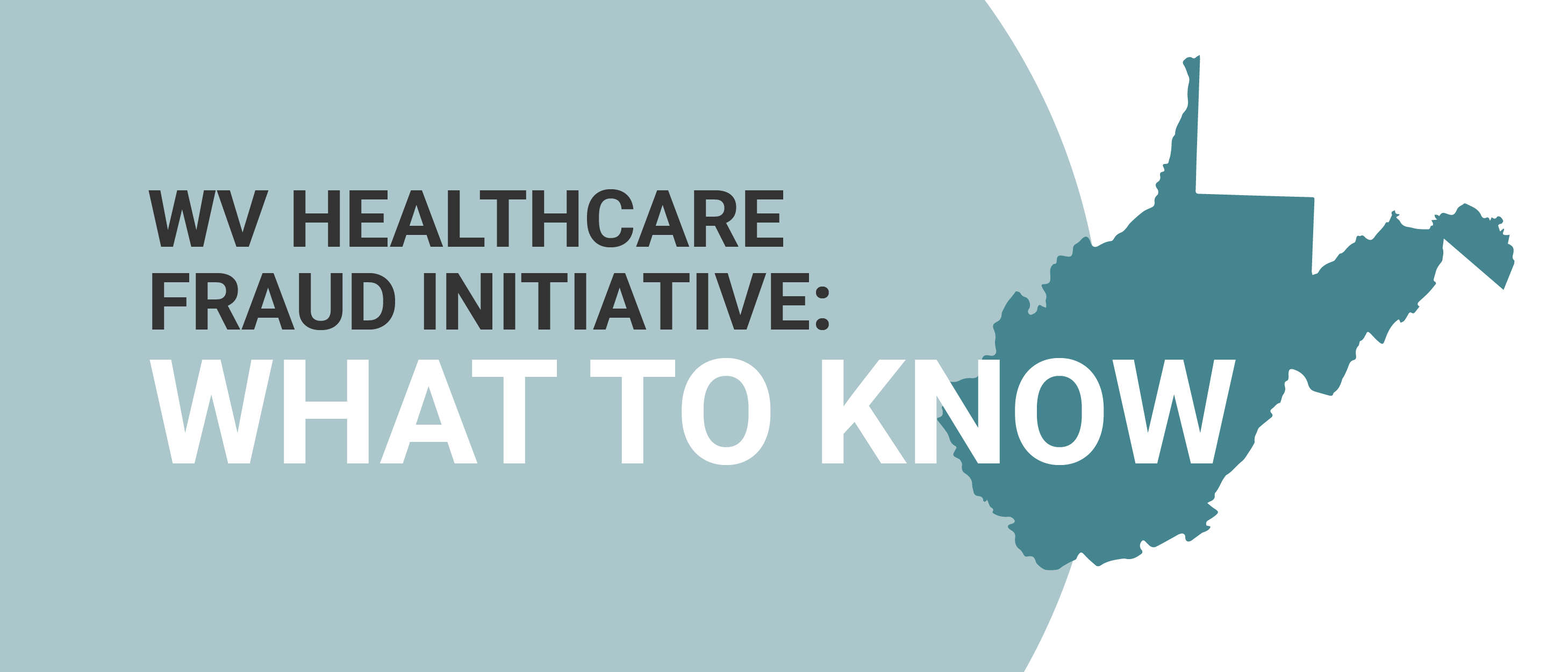Archive for the ‘Opioid Prescribing Audits’ Category
What West Virginia’s New Healthcare Fraud Initiative Means for You
Tuesday, February 1st, 2022
West Virginia healthcare providers are feeling the heat of a new initiative aimed at cracking down on healthcare fraud in the state.
On Jan. 18, U.S. Attorney for the Northern District of West Virginia William Ihlenfeld announced the launch of the Mountaineer Health Care Fraud Strike Force. He said the unit, composed of state and federal law enforcement agencies, will rely on data to combat waste and abuse in the health care industry.
“The time I spent in the private sector opened my eyes to the scope of the health care fraud that is occurring in West Virginia,” Ihlenfeld said. “It made me realize that more can and should be done by law enforcement, which is why this new group has been formed.”
The group first met the day of the announcement, Ihlenfeld said. The seven agencies present discussed fraudulent billing patterns and identified new targets for investigation. In addition to enforcement, the group will work with providers and insurers so that there’s a better understanding on how to recognize and report health care fraud, he said.
Health care fraud in West Virginia is intimately linked with the state’s opioid crisis. The state has one of the highest rates of non-medical use of prescription pain relievers in young people in the country and opioids are the number one cause of overdose deaths in the state, according to West Virginia’s attorney general’s office.
Health care fraud cases in West Virginia tend to be complex. In addition to opioid and controlled substance over prescription, cases tend to involve additional layers of illegal kickback and referral schemes involving doctors, pharmacies and laboratories.
In one high-profile recent case, Wheeling Hospital, Inc., in Wheeling, West Virginia, agreed in 2020 to pay $50 million to settle alleged False Claims Act violations. The federal government alleged the hospital knowingly submitted claims to Medicare that resulted from violations of the Physician Self-Referral Law and the Anti-Kickback Statute.
The government alleged the hospital, under prior management, violated federal law by knowingly and willfully paying improper compensation to referring physicians based on the volume or value of the referrals or was above fair market value.
At Med Law Advisory Partners, we work with healthcare providers to both preempt such investigations and provide critical support to healthcare entities facing active investigations.
For decades, Med Law’s consulting nurse experts have supplemented in-house legal and compliance teams in reviewing medical records for appropriateness of care and medical necessity, resulting in measurable, positive outcomes in investigative matters.
In the area of controlled substances, the Med Law team works with our clients to ensure they implement safe prescribing practices and help minimize the fallout in the event of a compliance investigation. Our consulting nurse experts have experience in providing audit support in investigations related to allegations such as reckless prescribing of narcotics and wrongful death related to overdose from prescribed controlled substances.
We also respond to active investigations, providing critical medical record reviews that can help clients facing costly penalties.
Taking a proactive posture will be crucial for health care organizations when it comes to the current environment in West Virginia. By evaluating policies and procedures, as well as ensuring effective training and compliance programs are in place, health care organizations can reduce their exposure to such claims.
We are here to help your health care provider clients prevent and mitigate the fallout from investigations surrounding controlled substances as well as the full spectrum of healthcare fraud. Contact us today for more information.
Opioids, healthcare fraud to remain top priorities under Biden DOJ
Monday, October 18th, 2021
For decades, Med Law’s consulting nurse experts have supplemented in-house legal and compliance teams in reviewing medical records for appropriateness of care and medical necessity, resulting in measurable, positive outcomes in investigative matters.
Healthcare providers can expect a continued high level of scrutiny when it comes to federal prosecutions of healthcare fraud, a U.S. Department of Justice official recently told a group of healthcare attorneys.
Michael Granston, deputy assistant attorney general for the DOJ’s commercial litigation branch, told the attendees of the American Health Law Association’s annual meeting in June that 2020 was a record year for healthcare fraud prosecutions.
Of the more than 900 new matters opened by the DOJ that year, 580 were health fraud matters. Most were prosecuted under the False Claims Act, which allows the federal government to prosecute fraud against the government and incentivizes whistleblowers to file claims.
Last year the department settled 265 healthcare-related False Claims Act claims, a record high.
Granston told the group to expect more of the same under the new Biden administration. He also shared that the DOJ plans to focus its prosecution efforts on contributions to the opioid epidemic, electronic health record misuse, manipulation of Medicare’s managed care program, senior citizen abuse, and COVID-19 relief fund fraud.
The result is continued exposure for healthcare organizations. According to the law firm Gibson Dunn, through the first half of 2021, False Claims Act settlements in the health care and life sciences industries totaled more than $228 million.
Med Law Advisory Partners collaborates with healthcare organizations in taking proactive measures to prevent such litigation, as well as measures in response to it.
For decades, Med Law’s consulting nurse experts have supplemented in-house legal and compliance teams in reviewing medical records for appropriateness of care and medical necessity, resulting in measurable, positive outcomes in investigative matters.
In the area of controlled substances, the Med Law team works with our clients to ensure they implement safe prescribing practices and help minimize the fallout in the event of a compliance investigation. Our consulting nurse experts have experience in providing audit support in investigations related to allegations such as reckless prescribing of narcotics and wrongful death related to overdose from prescribed controlled substances.
Taking a proactive posture will be crucial for healthcare organizations when it comes to the current environment. By evaluating policies and procedures, as well as ensuring effective training and compliance programs are in place, healthcare organizations can reduce their exposure to such claims.
Let our team of experts supplement yours. Contact us for more information on how Med Law can partner with your organization.
Auditing Prescribing Practices in Opiate Enforcement Cases
Thursday, February 7th, 2019
ALN Nurse Consultants have experience in providing audit support in investigations related to allegations such as reckless prescribing of narcotics and wrongful death related to overdose from prescribed controlled substances. ALN is on the leading edge of the opiate investigation trend and has significant experience in auditing provider prescribing practices.
In the featured case, ALN was retained to evaluate the care and services provided by a physician under investigation by the Department of Health, Office of General Counsel.

The ALN team mobilized and created a work product to support extraction of the necessary information—on a tight deadline with a massive amount of patient records needing evaluation. Since the trend in allegations of reckless prescribing is evolving, ALN created a custom template for the client which helped the legal team more clearly understand the facts of the case and provide easy access to the details related to the allegations. Our nurse consultants were able to review medical records for sixty patients, over 1,800 patient encounters amounting to over 8,200 pages of records, with just a two-week turnaround. With each patient, ALN zeroed in on whether the provider documented the etiology and objective findings of pain; followed the state’s standard of care in prescribing with regard to the applicable case law; checked the Controlled Substance Monitoring Database (CSMD); fulfilled other required testing to screen for potential addiction; and considered other therapeutic treatments for the patients’ pain. Our nurse reviewers also audited the state pharmaceutical database to evaluate for controlled substances prescribed by other providers during the time the patients were under the defendant physician’s care. Our reviewers analyzed more than 400 narcotic log entries for instances of “other prescribing” providers.

ALN created an individualized work product for our client which very clearly condensed the most crucial evidence into a quick access format, which helped facilitate identification of next best steps in the investigation.
An essential component of analysis when auditing provider prescribing patterns is determining the Morphine milligram daily equivalents (MME) for each patient encounter and the MME trend over time. According to the CDC, “higher dosages of opioids are associated with higher risk of overdose and death, even with relatively low dosages (20-50 MME per day).”[1] Dosages at or above 50 MME/day increase the risk for overdose by at least two times. Updates to state legislation are ongoing with regard to the provider and pharmacist responsibility in recording and monitoring the patient’s MME. In the featured case, the patient’s MME started at 30 and reached levels up to 180 with multiple combinations of opioids prescribed.
Few legal nurse consulting firms have experience in DOJ/OIG investigations, even though this is a burgeoning section of health law litigation in the U.S. Auditing provider opioid prescribing patterns can be a massive undertaking. ALN has the expertise and resources to support the investigative team in cases where inappropriate prescribing is suspected or alleged. Although the outcome of any audit may not always be favorable, the information a legal nurse consultant can unearth is a key piece in helping determine next best steps in opioid matters.
[1] https://www.cdc.gov/drugoverdose/pdf/calculating_total_daily_dose-a.pdf
Opioid Addiction Resources
Monday, August 20th, 2018
Drug overdoses are the leading cause of death among Americans – 1 American dies of overdose every 9 minutes. 66% of the more than 63,600 drug overdose deaths in 2016 involved an opioid. Opioids are a class of drugs that include prescription pain medications like oxycodone and morphine, as well as illegal drugs like heroin and synthetic opioids such as fentanyl.
If you or a loved one have been affected by the use of opioids, our friends at Help.org are here to help you.
Guide to Heroin Addiction: Dangers & Side Effects
This guide combines current research to provide you with a complete explanation of the dangers, effects, and trends of heroin use in today’s society by compiling information from government and international agencies, scientific studies, and multiple news and print sources. Read more…
Guide to Heroin Addiction: Rehab & Recovery
This page compiles information from multiple health agencies and scientific studies to give you a holistic understanding of how to get help overcoming your (or your loved one’s) addiction to heroin. Read more…
Opioid Use and Abuse
Monday, June 27th, 2016
With the death of Prince from an overdose of the narcotic Fentanyl, another celebrity becomes a statistic in the opioid drug overdose epidemic, currently gripping the United States. This epidemic is responsible for nearly half a million deaths between 2000 to 2014, according to the Centers for Disease Control and Prevention (CDC). Increases in prescription opioid analgesics and heroin deaths are thought to be the forces fueling the epidemic.
Opioid Use – A Dangerous Trend
Since 2000, the CDC reports a 200% increase in the rate of overdose deaths related to the use of opioid pain relievers and heroin, the main drugs associated with overdose deaths. During that time period, death rates from opioid overdoses increased significantly for both sexes, in persons aged 25–44 years and those older than 55 years of age. The states of West Virginia, Ohio, Kentucky, New Mexico and New Hampshire are the most affected.
Natural and semisynthetic opioids, which include the most commonly prescribed opioid pain relievers, oxycodone and hydrocodone, continue to be involved in more overdose deaths than any other opioid type. One component of opioid overdoses is believed to involve illicitly-made fentanyl, a short-acting opioid.
Heroin-related deaths increased in recent years. A history of misuse of prescription opioids is the strongest risk factor for heroin initiation and use. Increased availability of heroin, its relatively low price compared to prescription opioids and high purity appear to be major drivers of the upward trend in heroin use, overdoses, and deaths.
New Guidelines
On March 15, 2016, just weeks before Prince’s death, the CDC released its Guideline for Prescribing Opioids for Chronic Pain – United States 2016. The guideline was developed to assist primary care providers in ensuring the safest and most effective treatment for their patients with chronic pain which is not related to active cancer treatment, palliative and end-of-life care.
The guideline presents twelve recommendations for providers who manage chronic pain patients. Arguably, the most important guideline recommendation is the endorsement of nonopioid therapy as the preferred method of dealing with chronic pain. The use of opioids should be limited to situations when the benefits for alleviating pain and improving function outweigh the risks of opioid use. And when opioid analgesics are prescribed, it is recommended that providers prescribe the lowest dose found to be an effective treatment of an individual’s pain. Frequent follow-up and evaluation of the drug treatment plan is suggested. The guideline encourages the provider to become a partner with the patient in developing treatment goals and outline how the opioids will be discontinued if no benefit is achieved. The CDC Guideline can be accessed at http://www.cdc.gov/drugoverdose/prescribing/guideline.html.
If you or someone you know suffers from an opioid addiction, please consider contacting SAMHSA’s National Helpline for help or reach out to the National Institute on Drug Abuse.
ALN Consulting is a national provider of medical-legal consulting services, founded in 2002. Expertise includes, yet is not limited to, medical malpractice, long-term care, product liability, class action/mass litigation, and toxic tort. ALN Consulting can assist your defense team with finding the documentation to strengthen your case.